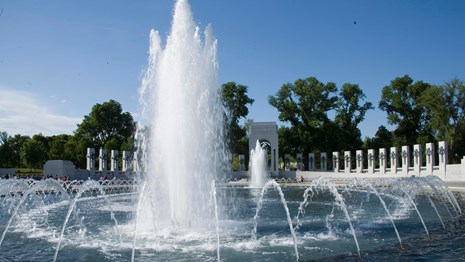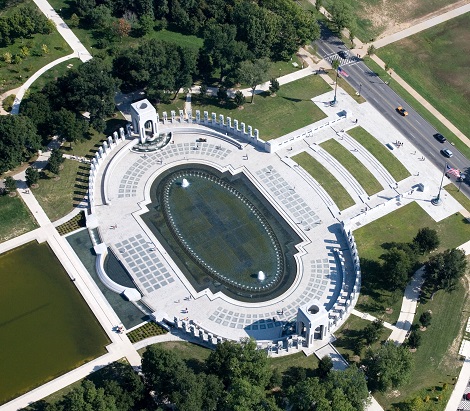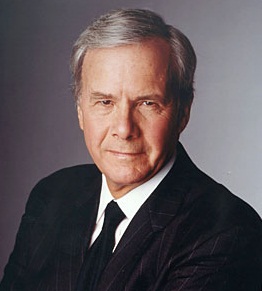[AUTHENTICITY CERTIFIED: Text version below transcribed directly from audio]
Thank you all, very much.
It goes without saying that this for me is a special privilege here today because we gather to pay tribute to sacrifice and valor, to common cause and compassion, to triumph and determination.
It has taken too long to erect this monument to symbolize the gratitude of our nation now and forever more to those of you who answered the call at home and abroad in what General Kelley rightly called the greatest war the world has ever known,1 a war in which more than 50 million people perished in their homes and on the battlefields a long way from home -- [in] infernos at sea and beneath the sea, and planes falling from the sky, and [in] gas ovens and in slave labor camps; a war, however, that for all of its cruelties and terrible cost was a just war and a great victory that will be remembered for as long as history is recorded.

So it is fitting that we gather today around this handsome and evocative monument to such a noble undertaking. But no monument, however well positioned or polished, can take the place of the enduring legacy of all of you, the people that we honor here today. Your lives and how you lived them, the country you defended and loved and cared for the rest of your days, that is the undeniable legacy of you, the men and women I call "The Greatest Generation."
Now my declaration that this is the greatest generation has occasionally been challenged even by members of that generation. My short answer is, that's my story and I'm sticking to it.
My longer answer, however, can be found in the trials and triumphs of your generation. At an early age this generation learned the harsh realities of deprivation and common cause during the Great Depression. They quit school not to indulge their selfish interest but to put food on the family table or shoes on their brothers and sisters. They just didn't double date, they went six and eight to a car to a dance or a movie where admission was maybe a dime. They learned to live without more than with. And as their children learned later, they never took a dollar for granted or spent one without thinking about it first.
Veterans here today will tell you that the first thing they noticed about basic training was breakfast. You could eat all that you wanted. Many got their first new pair of boots or trousers in basic training after a young life of hand-me-downs. Many will also tell you that before war came to America at Pearl Harbor they were opposed to this country getting involved. But when the Japanese attacked and the Germans declared war they converted overnight and transformed America into a mighty military machine -- in uniform and factories and laboratories and shipyards and coal mines and farm fields and shops and offices.
Men, women, young and old -- everyone had a role. Farm boys who had never been in an airplane were soon flying new bombers with four engines. Surgical nurses were in mash units on front lines operating while they were being shelled. Teenagers were wearing sergeant stripes and fighting from North Africa to Rome. Guys from the city streets were in close quarter combat in dense jungles. Women were building ships and whatever else was needed and driving trucks. Kids went without gum and new toys, and in too many cases, they went the rest of their lives without fathers they never knew.
In the halls of Congress and at the White House they bet the future of this country on the absolute necessity of unconditional victory while simultaneously creating new international, political, financial, and military institutions and alliances that protected and enhanced America's national interests through cooperation and common goals, through not just shared strength but also a shared commitment to diplomacy.
And when victory was complete, this generation, all of you, returned to this country and married in record numbers and went to college in record numbers thanks to the G.I. Bill. You gave us new industries and new art, new science, and unparalleled prosperity. But you also understood the real meaning of victory. You did not take revenge. Instead, you embarked on your next mission. Unprecedented for military victors, you rebuilt the shattered countries and confidence of your enemies.
Wherever you settled, you brought with them a discipline and maturity beyond your years, shaped by the hardships of a depression, the training and the horrors and the deprivations of war. Those of you who returned with unshakable nightmares of war were held through long nights by your uncomplaining wives, and when daybreak came you went off together to resume your lives without whining or whimpering.
You were conditioned to serve so you became members of the school board or elders in your church. You ran for mayor and governor and Congress, the Senate and the White House. You were the "join-up generation." You had given so much but you didn't hesitate to give more, because too many of your friends had died defending the way of life and system of government that is renewed only by good people willing to do the right thing. Some of you became rich, famous, and powerful. But the te[ll]-tale strength of this generation came from the ordinary men and women who awoke every morning to tend to the needs of their families, their communities, their nation, and mankind -- without expectation of recognition or reward.
Not every member had a common point of view. There were ferocious political battles by day, and one shared concern by nightfall: What is best for the country? On some issues it took a little longer than on others, for while this was a great generation, it was not perfect. When the men came home, it took them a while to fully appreciate the right of women to take their place at their side whatever the endeavor. And despite the unalloyed patriotism and the courage of black Americans and Hispanic-Americans, Japanese-Americans, Native Americans and other people of color during the war, it took too long, much too long, to legally and morally confront the cancer of racism.
When America was divided by another war and a cultural upheaval, The Greatest Generation was bewildered and divided, as well. But it didn't give up on the generation that came after -- their kids. Even though you wanted them to cut their hair, to get married before they lived together, and for God's sakes turn down the music. Moreover, as the men and women of The Greatest Generation know not everyone in their own generation was up to the standard. There were the slackards and the cowards; the profiteers and the blowhards; the bullies and the boneheads. But they've been forgotten now. They've been lost in the pettiness of their own behavior, overwhelmed by the sweeping and indisputable achievements of the authentic members of your generation -- The Greatest Generation.
On a personal note, I want to thank all of you for the privilege of sharing your stories and your lives. I am humbled by our relationship. Those of us in succeeding generations are deeply indebted to you for first giving so much of your youth, your families, and your friends to war, and then so much of the rest of your days to your country, and to the world. As I know personally, so many of you have been reluctant to talk about these difficult days because the painful memories have not faded. And because, as so many of you have said, you were the lucky ones. You came back. You survived. So many of your friends did not.
So you have felt an enduring obligation, a duty to them, to live your life in a way that honors them. Your lives have led the way in war and peace. And now it falls to the succeeding generations, to the rest of us to honor your lives, the greatest legacy of the greatest generation, not with words or memorials or ceremonies and tributes. We are honored and obligated to honor you with our lives by fulfilling our duty, the duty to carry on your noble mission.
I salute each and every one of you.
Thank you all very much.

 Book/CDs by Michael E. Eidenmuller, Published by
McGraw-Hill (2008)
Book/CDs by Michael E. Eidenmuller, Published by
McGraw-Hill (2008)
1 Unconfirmed as delivered. However, during his National WWII Memorial dedication address General P.X. Kelley stated: "that that World War II was the most significant event in the history of mankind. It was a conflict which involved every man, woman and child in our country. It was a conflict in which over 53 million souls departed from this planet – and it was a conflict in which over 400,000 Americans made the supreme sacrifice – but in the end it was a conflict in which our way of life prevailed" (emphasis added).
Audio Source: C-SPAN.org
Image #1 of WWII Memorial Source: https://www.nps.gov
Image #2 of WWII Memorial Source:
https://en.wikipedia.org
Page Updated: 5/25/22
U.S. Copyright Status: WWII Memorial Images = Public domain. Text, Audio, Image of Mr. Brokaw = Uncertain.

